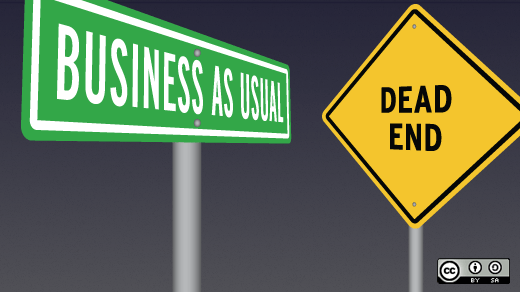The list of major corporations getting involved with open source communities is persistently growing, a trend evidenced by the rapidly expanding financial backing of open source foundations like the Linux Foundation. Samsung is one of these companies through its Open Source Group which was established in February of 2013. It's part of an effort to bridge the gap between the company and the open source communities it relies on and to promote the use and development of open source technology within many sectors of the company.
Guy Martin is a Senior Strategist for Samsung Research America as a part of the Open Source Group, and he has played a key role in bringing greater integration of open source development into Samsung's corporate model. He has embarked on a 4 year mission to establish open source leadership across the company to support the broad range of products they create that are built upon open source software. In this interview, Guy discusses how open source is being integrated into Samsung and the role open source developers play in that process.

In your talk on developing OSS leadership you stress the importance of understanding how open source communities utilize governance and communication. What steps has Samsung taken to foster closer collaboration between the company and the open source communities it interacts with?
We've approached this in two ways:
1) Hiring maintainers/key contributors who are already familiar with and working in those communities so that we have a good start with these groups.
2) Utilizing these key hires to help mentor/train our other engineers in how to approach and collaborate with these communities.
Once other teams can see how our team is able to have impact through their contributions, they get excited and motivated to do the same.
It seems greater numbers of communities and companies are relying on foundations to improve collaboration between companies and to provide support, both monetary and developer time, to open source projects. What are the greatest benefits Samsung has seen as a result of increasing its involvement with open source foundations in recent years?
Two of the biggest areas that our increased involvement has helped with are visibility and the 'human network.'
As a Platinum member of the Linux Foundation, for example, we are able to showcase our support for Linux and key open source projects that we rely on in the entire ecosystem. Speaking at Linux Foundation sponsored events not only helps us with our open source visibility, but provides a great way for us to find potential candidates for our team. Did I mention we were hiring?
On the 'human network' side, there simply is no substitute for what participation in these foundations brings. As an example, when Samsung had an issue with GPL compliance last year, our relationships with the Linux Foundation, Software Freedom Conservancy, Software Freedom Law Center, and others helped us to resolve this situation (code release) in 2 weeks, as opposed to a previous GPL violation situation which took months to deal with.
What are some of the major obstacles you have encountered, both internally and externally, while growing the work of Samsung's open source group and what have you done to address them?
Surprisingly, very few of the obstacles have been external. The community has seen that Samsung is serious about being a better open source citizen. Clearly, we aren't there yet, but the momentum we are seeing is undeniable, and our team is planning for expansion to continue this trend (did I mention we are hiring? :))
Internally, we've faced both infrastructure and cultural challenges. Thankfully, the organization has given us a lot of freedom to address the infrastructure issue, and I've setup an open source-based infrastructure that allows for our developers to use tools like git, irc, wikis, etc. to do their jobs, while having a minimal amount of reliance on the Windows-only tools that the company uses.
Culturally, we still have some challenges. These are mainly due to existing management and development processes. The good news is that, again, the organization recognizes that they need to adapt, and our open source group has helped create a training/mentoring program to encourage and guide developers and managers in how to adopt open source best practices.
We've started with about 35 candidates through this leadership program this year, and are looking to expand it even more in the future. This is critical, as the open source group simply cannot
grow fast enough to have the kind of impact we need to for Samsung - it's imperative that we grow the open source leadership base within the entire company.
Employers are increasingly looking towards open source communities to find talented software developers making it more important than ever to understand the open source development process. What traits and abilities do you value the most in developers who work with open source technologies for Samsung?
Well, since we hire (have I mentioned before that we are hiring? :)) mostly maintainers or key contributors to work directly for our team, we expect that they'll have skill sets that have gotten them to these leadership positions in open source.
However, as we search for candidates for the team, or grow more of these people internally, we are looking for not only coding skills, but solid interpersonal skills (negotiation, compromise, etc.) as well as communication/presentation skills. It used to be that you could be the best coder on the block, and that was enough. In some projects, that might still be the case, but to effectively balance a community's needs with a corporation's wants, you have to be able to code/design well, and also articulate ideas and sell them to others.
In your opinion, what is the most exciting thing happening in open source right now?
This may upset some of the more idealistic folks in open source, but I think that the growing influence of companies is changing the face of open source in a good way.
Money and resources are being brought to bear on problems that need solving and technologies to address them. My hope is that the strong community and collaboration model present in most projects will provide a balanced and shared control environment that helps all participants get value from participating, regardless of their corporate affiliation.
Could you provide a short preview of what you will be talking about at All Things Open this year?
I'm fortunate enough to be co-presenting with my friend and colleague Shawn Briscoe, Director of Open Source Strategic Services at Black Duck.
We share a similar passion for open source and communities, and we plan to talk about not only building open source leadership in companies like Samsung, but also how adopting an 'inner-source' model can help your development organization be more productive and happier. I'm really looking forward to coming back to Raleigh again, since I was last there as a member of Red Hat.
See the full series of All Things Open 2014 speaker interviews.







Comments are closed.